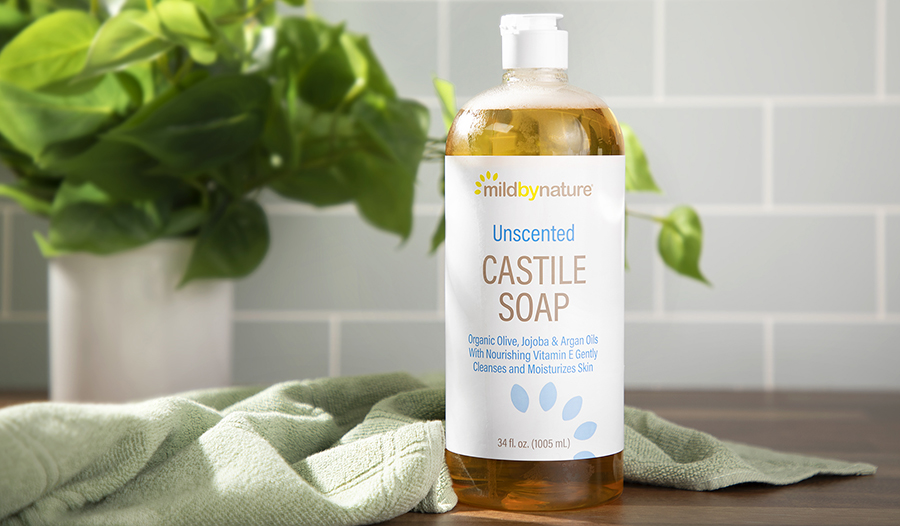Castile Soap—A Household Staple for Health, Cleaning, and Bathing
DISCLAIMER:This blog does not intend to provide diagnosis...
- In this article:
- What Is Castile Soap?
- What Is Castile Soap Made Of?
- Benefits of Castile Soap
- Castile Soap for Cleaning
- Castile Soap for Bathing
- Takeaway

What Is Castile Soap?
Castile soap is a centuries-old cleansing agent with amazing benefits ranging from supporting a healthy body to promoting a healthy environment. If you are looking for the perfect multipurpose cleaner for your family, you should consider castile soap.
What Is Castile Soap Made Of?
Castile soap is made entirely of vegetable fats. Traditionally made from olive oil, castile soap can be made from coconut oil, palm oil, or even hemp seed oil. Castile soap gets its name from Castile, Spain, a region rich in olive oil production, where the soap was said to originate from during the Middle Ages.
Historically, soap was made with animal fat or tallow. Modern soap products are made with synthetic ingredients that may be harsh for those with sensitive skin or seeking to minimize chemical exposure.
Unlike other soaps, castile soap is all-natural and vegan because it is made without any synthetic or animal ingredients. And because castile soap is gentle and all-natural, it is a fantastic choice as a multipurpose cleansing agent for health, cleaning, and bathing.
Benefits of Castile Soap
Chemical-Free
Many of today’s soaps are made with synthetic and artificial ingredients that may aggravate sensitive skin. A conventional bar of soap may have up to 12 different ingredients, some of which may be harsh chemicals affecting overall health.
For example, many soap products contain sodium lauryl sulfate or SLS. SLS is a chemical that acts as a surfactant. A surfactant reduces the surface tension between two liquids, which helps them blend more easily. An example is the blending of oil and water, which doesn’t occur without a surfactant such as the SLS often used to make soap.
Studies suggest that SLS may irritate skin, causing dryness and redness even in those who do not have sensitive skin or eczema. Other synthetic chemicals, such as cocamidopropyl betaine, may also cause harsh skin reactions.
One study in 2007 found that cocamidopropyl betaine, a surfactant similar to SLS, was linked to allergic contact dermatitis of the eyelids. This was noted primarily when participants used a face or body wash containing the chemical. Allergic contact dermatitis is marked by skin irritation, redness, dryness, and itchiness.
This condition is caused by the body’s immune system reacting to protect it from a substance, perceived as a threat, that has been placed on the skin.
Another common synthetic soap ingredient that may cause concern for those who wish to lower their exposure to chemicals in cleaning products is fragrance. In many conventional soap products, synthetic fragrances are added to create a pleasing smell or cover an unpleasant one.
Fragrance-Free
In addition to added fragrance, many synthetic soaps have chemical stabilizers or functional ingredients added to preserve or stabilize the fragrance of the product. Without these functional ingredients, the finished product would lose its scent over time.
Fragrances have been linked to conditions ranging from eczema and immune dysfunction to early puberty and endocrine disorders. According to the International Fragrance Association, 3,619 different chemicals are used as fragrances and functional ingredients.
Castile soap doesn’t have any of these extra chemicals. This makes castile soap a chemical-free option that may help protect and nourish sensitive skin while reducing the chances of allergic dermatitis. It also limits the number of chemicals placed on the body, which may help promote healthy immune and endocrine systems.
Environmentally-Friendly
Castile soap is also beneficial for the health of the environment. Studies link synthetic chemicals in conventional soaps, like cocamidopropyl betaine, to toxicity in marine life, such as the death of particular marine algae. Other studies suggest that these chemicals may negatively affect whole ecosystems, with the components of the synthetic chemicals being distributed through the water cycle.
Since castile soap doesn’t contain any harsh or synthetic chemicals, it doesn’t cause or contribute to the chemical pollution of delicate ecosystems. It is also biodegradable, so it doesn’t leave any toxic environmental effects.
Castile Soap for Cleaning
Fruit and Vegetable Wash
Using castile soap to wash fruits and vegetables of pesticide residues is a great way to clean produce safely. Just add a teaspoon to a sink full of water and rinse your fruits and vegetables.
All-Purpose Cleaner
Castile soap is a gentle, effective all-natural, all-purpose cleaner. This means that castile soap can be used in many different areas without fear of introducing unwanted chemicals into your home or harming any delicate surfaces.
Dishwashing Detergent
Replacing conventional dishwashing detergents with castile soap can keep hand-washed dishes squeaky clean while helping ease dry hands. Cleaning up a spill on the kitchen counter with castile soap can clear the mess without leaving behind chemical residues that children may come into contact with or inadvertently ingest with a meal.
Laundry Detergent
Doing laundry with castile soap can help to protect sensitive skin from unnecessary chemicals and fragrances. Since castile soap is safe to use in the washing machine, you can use 1/2 cup for a bigger load of laundry to help get your clothes clean without harsh detergents.
Surface Cleaner
Castile soap is also an effective cleaner for the many surfaces in the bathroom. It can clean walls, tubs, showers, sinks, and toilets without abrasive detergents or toxic chemicals. Add 1 part castile soap to 1 part baking soda and mix with hot water for safe, chemical-free cleaning.
Floor Cleaner
Castile soap can also be used on floors for a squeaky clean effect by adding 1/4 cup of castile soap to a bucket of hot water to mop up messes. Carpets can also benefit from a castile soap cleaning by using a small amount of the soap for spot treatments—but test a hidden part of the carpet before using it throughout the room. However, you should avoid castile soap on waxed wood flooring because it can potentially strip the wax.
Add Essential Oils
Combining castile soap with a few drops of essential oils can help boost the cleaning power of this fantastic soap while adding a pleasant chemical-free scent to your home. Essential oils like tea tree oil, eucalyptus, and citrus have potent antimicrobial and soothing properties that can help safeguard your home without the toxicity of added synthetic chemicals.
Castile Soap for Bathing
Soothe Irritated Skin
When it comes to relieving dry, irritated skin, castile soap can’t be beaten. This soap can help soothe dry, parched skin for a relaxing, chemical-free clean. Since castile soap is made from plant oils, its rich emollient properties help to calm and soothe skin while providing gentle cleansing.
Oils like olive oil, coconut oil, and hemp seed oil have several vitamins, phytonutrients, and antioxidants to help protect and support healthy skin.
One study using human skin cells found that olive oil provided significant benefits to skin under stress. The study used human skin cells that were subjected to high levels of stress hormones like adrenaline.
High levels of stress hormones led to the thinning of the skin's outer protective barrier and significant collagen loss. The cells were then treated with olive oil. The cells treated with olive oil saw an increase in collagen production and a restoration of both the outer layer (epidermis) and inner layer (dermis) of the skin. The plant oils in castile soap may have an anti-aging effect on the skin.
Bubble Bath
Because castile soap is so gentle, moisturizing, and potentially beneficial for skin health and longevity, it is perfect for a relaxing bath. When using castile soap for a soothing bath, add 1/2 cup of liquid castile soap to warm water. If you want a relaxing bubble bath, add 1/4 cup glycerin and soap to the bath. Adding stress-relieving essential oils like lavender, clary sage, or chamomile can help reduce stress while nourishing the skin.
Foot Soak
Castile soap also makes a great addition to a soothing foot soak. Add in 1-2 teaspoons of castile soap and a few drops of essential oil to a small tub of warm water.
Gentle Face Cleanser
Castile soap is also gentle enough to be used on the face. Often, many conventionally formulated body soaps can’t be used on the face. This is because body soaps are usually formulated with harsher or more concentrated forms of chemicals than face washes.
A more concentrated formulation allows body soaps to remove dirt and grime from the body more effectively than a face wash. This isn’t the case with castile soap. Because castile soap has minimal ingredients, namely a plant-based oil and an alkalinizing agent, castile soap can be diluted to make it as gentle as needed.
Pet Shampoo
Castile soap is also safe enough for pets like dogs and guinea pigs. Because it is made up of natural plant oils, it is safe and a gentle and moisturizing cleaning agent.
Takeaway
Castile soap is tried and true gentle multipurpose cleaner that is non-toxic and environmentally friendly. This biodegradable plant-based soap is a household staple for health, cleaning, and bathing.
References:
- Ambrosio CMS, Diaz-Arenas GL, Agudelo LPA, Stashenko E, Contreras-Castillo CJ, da Gloria EM. Chemical composition and antibacterial and antioxidant activity of a citrus essential oil and its fractions. Molecules. 2021;26(10):2888. Published 2021 May 13. doi:10.3390/molecules26102888
- Deguchi H, Aoyama R, Takahashi H, Isobe Y, Tsutsumi Y. Harmful effects of synthetic surface-active detergents against atopic dermatitis. Case Rep Dermatol Med. 2015;2015:898262. doi:10.1155/2015/898262
- Endocrine Disruptors. National Institute of Environmental Health Sciences. Published 2022. https://www.niehs.nih.gov/health/topics/agents/endocrine/index.cfm
- Heetfeld AB, Schill T, Schröder SS, et al. Challenging a paradigm: skin sensitivity to sodium lauryl sulfate is independent of atopic diathesis. Br J Dermatol. 2020;183(1):139-145. doi:10.1111/bjd.18564
- IFRA Transparency List. International Fragrance Association. Published 2022.
- Marrakchi S, Maibach HI. Sodium lauryl sulfate-induced irritation in the human face: regional and age-related differences. Skin Pharmacol Physiol. 2006;19(3):177-180. doi:10.1159/000093112
- Oei HD. Eyelid dermatitis due to contact allergy to cocamidopropyl betaine. Journal of Allergy and Clinical Immunology. 2007;119(1). doi:10.1016/j.jaci.2006.12.163
- Olkowska E, Ruman M, Polkowska Z. Occurrence of surface active agents in the environment. J Anal Methods Chem. 2014;2014:769708. doi:10.1155/2014/769708
- Romana-Souza B, Monte-Alto-Costa A. Olive oil inhibits ageing signs induced by chronic stress in ex vivo human skin via inhibition of extracellular-signal-related kinase 1/2 and c-JUN pathways. Int J Cosmet Sci. 2019;41(2):156-163. doi:10.1111/ics.12520
- Sadlon AE, Lamson DW. Immune-modifying and antimicrobial effects of Eucalyptus oil and simple inhalation devices. Altern Med Rev. 2010;15(1):33-47.
- Vonlanthen S, Brown MT, Turner A. Toxicity of the amphoteric surfactant, cocamidopropyl betaine, to the marine macroalga, Ulva lactuca. Ecotoxicology. 2011;20(1):202-207. doi:10.1007/s10646-010-0571-3

 By Dr. Candace Mathers, N.D.
By Dr. Candace Mathers, N.D.


